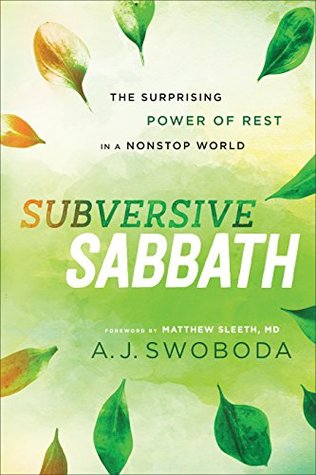More on this book
Community
Kindle Notes & Highlights
by
A.J. Swoboda
Read between
December 1, 2019 - June 11, 2020
We do not love God because God is useful to us. We love God because God is worthy of being loved. “God is interesting,” writes Gunton, “in and of himself.”51 Or to echo Karl Barth: “God is.”52 Sabbath, likewise, should not be understood in merely useful or pragmatic terms. A Sabbath is done out of obedience to God, not to get something. While there are endless benefits to keeping a Sabbath, we do not do it for the benefits, in the same way that we do not enter a marriage in order to make love. Sex is a benefit of marriage, not the reason for marriage.
Gerald May once lamented how a pragmatic culture often treats the Sabbath: “We know we need to rest, but we can no longer see the value of rest as an end in itself; it is only worthwhile if it helps us to recharge our batteries.”53 Sabbath is something enjoyed for its own sake, inviting us to play.
God never outlaws Sabbath play. On the contrary, Sabbath is time for creation to play in the world of God once again—as re-creation. Sabbath is the celebration of God’s life and his work in our lives. But our overproductive lives have no space for play or celebration.
The Sabbath creates space for rest and play in our lives. The prophet Zechariah looks hopefully to a future day in which our cities would have space for play: “This is what the LORD Almighty says: ‘Once again men and women of ripe old age will sit in the streets of Jerusalem, each of them with cane in hand because of their age. The city streets will be filled with boys and girls playing there” (Zech. 8:4–5). Such an urban environment has space, places for play, for walking, for talking. Even children play in the street. Can you imagine New York City without Central Park? Whenever God dreams of
...more
What was intended by God to be a celebration reflecting on his goodness and the goodness of his creation has been, once again, replaced by the devil’s false forms of celebration: drunkenness, loss of self-control, and debauchery. We sell ourselves short by celebrating for celebration’s sake rather than for God’s sake. The authentic call to Sabbath is to enter into celebration as God intended it to be, not what we think it should be.
But the Sabbath is not a form of indulgent individualism dressed in religious piety. Sabbath is about delighting in God for his sake and the sake of the world. Marva Dawn has said that Sabbath is about four things: ceasing, resting, embracing, and feasting.
It is in Sabbath that we enjoy, we delight, we relish in the goodness and generativity of God. We play. We feast. We rest. We echo with God, “It is good!” And in our Sabbath play, we discover that to play is to pray.60
Hear the words of Donna Schaper: “Sabbath keeping is a spiritual strategy: it is a kind of judo. The world’s commands are heavy; we respond with light moves. The world says work; we play. The world says go fast; we go slow. These light moves carry Sabbath into our days, and God into our lives.”61
L’khah Dodi, a traditional Jewish song sung on Friday nights. It goes, “Come in peace, and come in joy, Thou who art the bridegroom’s pride; Come, O Bride, and shed thy grace, O’er the faithful chosen race; Come, O bride! Come, O bride!” Our family sings a song called the Shabbat Shalom, or “Sabbath Peace.” Each person in the family is named.
some Jewish fathers, on the morning of the Sabbath, would give their children a spoon of honey. What a beautiful tradition! The idea was simple: that they would always remember the sweetness of the Sabbath for the rest of their lives. It is similar to the way the earliest Christians took Communion: with milk and honey. This symbolism was to remind them that in Christ they had come to the promised land. That
Reading this highlight bought me tears. What about this envoked this emotion. The making of the Sabbath sweet? The interaction between the father and children?
Nathaniel Hawthorne once wrote that the Sabbath sunshine was unlike any other sunshine during the week—that sunshine is a “shadow of great truths.”
I have a hunch: we will have jobs in the new Jerusalem. We will work. As Eden was a place of work, so will heaven be. Work was not a result of sin. Why? Because humans are homo faber (humans who work), created to “tend and keep” and enjoy the fruits of their work. So close to their human function was work that the biblical author uses the same word for “tend” as “worship.” To care for the garden was to worship the Creator. Eden was a divine domain of work and worship, not a world of sedentary laziness or unproductivity. The created world was to be creatively worked and nurtured. Work is not a
...more
Jewish rabbis have a phrase, melechet machshevet, to illustrate this reality, meaning that our work “is done unto the realization of God’s plan and vision.”7
“Achievement,” once wrote Mary Bell, “is the alcohol of our time.”8
This act of Adam naming Eve initiates, I believe, a perversion of God’s desire that Eve would work alongside Adam in loving, mutual harmony to work and care for the garden. In fact, God saw it coming when sin entered the world. When God tells Eve that Adam will “rule over her,” he is simply lamenting what is to come.


